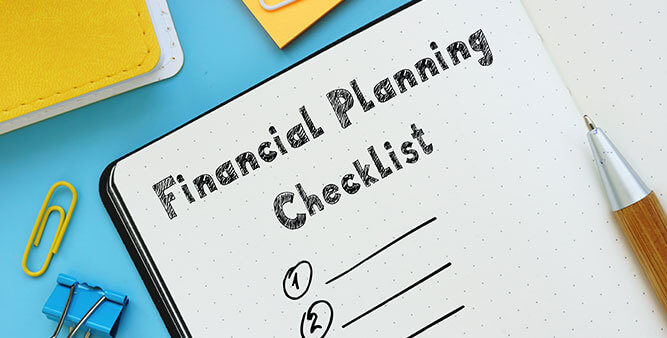
Financial Planning Checklist
Once you’ve finished with your tax planning for the year, and your return is safely on its way to the IRS, you’re at an excellent point for a quick financial check-up. Your tax return is handy, as a quick snapshot of your financial situation and the figures are recent and accurate. Take a few minutes to consider these questions:
1. Have you determined your short- and long-term financial goals?
Have you consistently reviewed and updated them for any changes?
2. Are you saving and investing sufficient sums to fund your short- and long-term goals?
By defining goals that are time and dollar specific, you can regularly assess if you are on track to reach them.
3. Are you making the best use of tax-deferred savings plans, such as IRAs, 401(k)s, and Keoghs?
Are you contributing the maximum you can? Did you make plan investment choices consistent with your investment time frame and risk tolerance? Alternatively, are you satisfied that you have worked out the most appropriate way to take withdrawals for both yourself and your designated beneficiaries, with a careful balancing of income tax and estate tax considerations?
4. If you are an employee, are you getting the optimum from your employee benefits?
Do you understand and use any flexible spending accounts that you may be eligible for? Have you developed a strategy for exercising your employer stock options and using any deferred compensation plans?
5. If you are concerned about paying for a child’s education, are you saving and spending in the most appropriate ways?
Are you using tax-deferred savings, tax-favored loans, and tax credits? Are you striking an appropriate balance between saving in the child’s name (either outright or in trusts) and saving in your own accounts?
6. Do you have an “emergency fund?”
Many experts recommend that you have the equivalent of three to six month’s take-home pay in an account where you can get at it quickly. An emergency fund gives you cash to weather a squall or two without having to disturb your investment portfolio or sell off any other assets.
7. Have you checked the asset allocation of your portfolio lately?
Run-ups and downturns in the market can each disrupt the allocation of your investments, leaving you with more or less in any one asset class than you consider optimal. Should you be thinking about tax-free or taxable fixed income securities, based on your marginal tax rate and risk tolerance?
8. Do you have adequate insurance?
If you die unexpectedly do you have enough life insurance to protect your family? What about disability insurance if you or your spouse couldn’t work for an extended period of time? Most people have auto insurance is required by law and most homeowners also are required to have adequate homeowner’s insurance, but did you know that it’s just as important to have insurance to protect the contents of your home even if you rent it?
9. Do you have all of the necessary legal documents in place?
Is your will up-to-date? How about your estate plan? Trusts for you and/or your spouse and other heirs? A living will or other health care directives? A durable power of attorney for managing your assets if you can’t? Have you told family members or trusted friends where they can find these documents?
10. Is your credit under good control?
Is the interest rate on your mortgage the best you can do, or should you be applying for a lower rate? Should you be shopping for a credit card with a lower interest rate, or perhaps for a home equity loan?
11. Are you maximizing your cash flow through income tax strategies?
How are you funding charitable contributions — with cash or securities? Do you prepay itemized deductions to accelerate the tax benefit?
12. If you own your own business, do you have a plan for smoothly passing on that business to family members or trusted employees?
Are you aware of and planning for any income and related estate taxes? Are you making optimum use of insurance to safeguard your transition plans?
13. Have there been significant changes in your family this year?
Births, deaths, graduations, engagements, and the beginning and ending of marriages can all have multifaceted effects on your financial plans. Consider their effect on your own situation. You may want to start a college fund for a new baby, or make a plan for investing assets you’ve inherited, or make provision for your daughter’s wedding next summer. On the other hand, if you have recently divorced, you will want to review the beneficiary designations on your insurance policies and retirement plans.
Back to top



